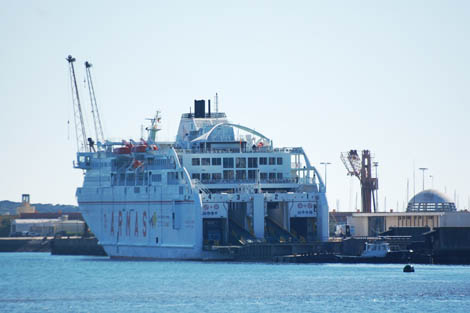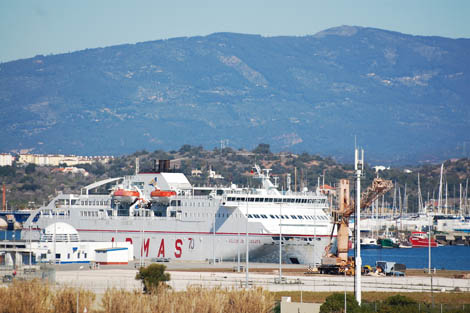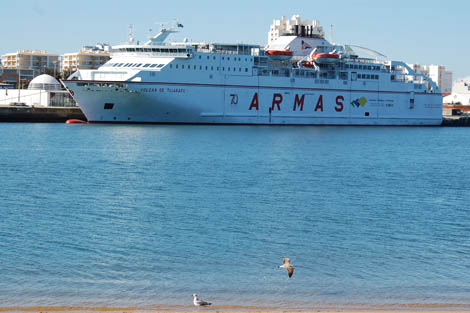 The Spanish shipowner Naviera Armas wanted to resume, this summer, the ferry service between Portimão-Madeira-Canárias, but the bureaucratic obstacles were so many that he ended up giving up.
The Spanish shipowner Naviera Armas wanted to resume, this summer, the ferry service between Portimão-Madeira-Canárias, but the bureaucratic obstacles were so many that he ended up giving up.
The information was revealed by Captain Monteiro Marques, of the shipping company that has been working in Portugal with that shipowner, during the session-debate on the potential of the Algarve's sea promoted yesterday, in the auditorium of the Museum of Portimão, by the Union of Captains, Officers , Merchant Marine Commissioners and Engineers (Mar Officers).
«This year, the shipowner tried to make the summer here again. He asked IPTM for authorization, but the answer was that we needed to start the whole process from the beginning. It would be a cyclopean task, especially since, when the shipowner operated here, we spent the entire year of 2007 and 2008 dealing with the bureaucracies of the process».
In other words, if the shipowner had actually started the process to resume ferry connections between mainland Portugal and the islands of Macaronesia, during the summer season, the summer would have passed and the service would not have started yet.
Monteiro Marques also explained the main reasons that led Naviera Armas to end this ferry, which operated between June 2008 and January 2012, carrying 100 passengers and 50 vehicles, offering a weekly ro-pax connection (for vehicles and passengers).
 A last trip of the ferry «Volcan de Tijarafe», between Funchal and Portimão, took place on Sunday, January 30, 2012, and the ship's arrival in the Algarve was accompanied by the report from Sul Informação.
A last trip of the ferry «Volcan de Tijarafe», between Funchal and Portimão, took place on Sunday, January 30, 2012, and the ship's arrival in the Algarve was accompanied by the report from Sul Informação.
«When the service was thought out, a plane ticket to Funchal cost around 400 euros and we started by offering the service at 75 euros per person. Afterwards, the plane went down to 45 euros and we were forced to go up to 95 euros. Who is the person who prefers to spend 30 hours on a ship, instead of an hour and a half on a plane, especially at these prices?” explained Monteiro Marques.
“We even had the ships filled with trucks and cars. But passenger transport represents 50% of revenue and if we don't get that, we're losing money».
But the final blow was given by successive increases in port fees in Funchal, as well as other obstacles that were always placed by the Regional Government of Madeira to the operation of this ferry, which was the only regular connection by sea from that Autonomous Region to the Continent.
«While in Portimão we only had support, including reducing port fees and even pilotage fees, in Madeira they were always problems. The port fees in Funchal were ten times more expensive than those in Portimão», added the responsible for the shipping company.
 In January 2012, when the connection was suspended, Javier Garcia, representative of the Spanish shipowner Naviera Armas, had said that loading or unloading a trailer in the port of Funchal "costs approximately 140 to 150 euros, while in the Canaries it costs 50 euros", adding that, in 2011, Naviera Armas paid one million euros in port fees in Madeira.
In January 2012, when the connection was suspended, Javier Garcia, representative of the Spanish shipowner Naviera Armas, had said that loading or unloading a trailer in the port of Funchal "costs approximately 140 to 150 euros, while in the Canaries it costs 50 euros", adding that, in 2011, Naviera Armas paid one million euros in port fees in Madeira.
In other words, with the bureaucratic obstacles in mainland Portugal and the lack of interest from the authorities in Madeira, it is not expected that the ferry operation from Portimão will be able to resume soon.
Nevertheless, from the debate on “Paths to the Future of Ports and their Workers in the Algarve”, promoted by OficiisMar, a recommendation emerged for the creation of “regular maritime connections”, through a Portimão-Madeira-Canárias line, on a ferry that it could even serve as a “living school” for future sea workers, in a partnership between the Infante de Sagres Nautical School, the Algarve Hotel and Tourism School and the Algarve University.
This and other recommendations that came out of the OficiisMar debate will now be sent to the various ministries and other bodies responsible for maritime issues.


















Comments